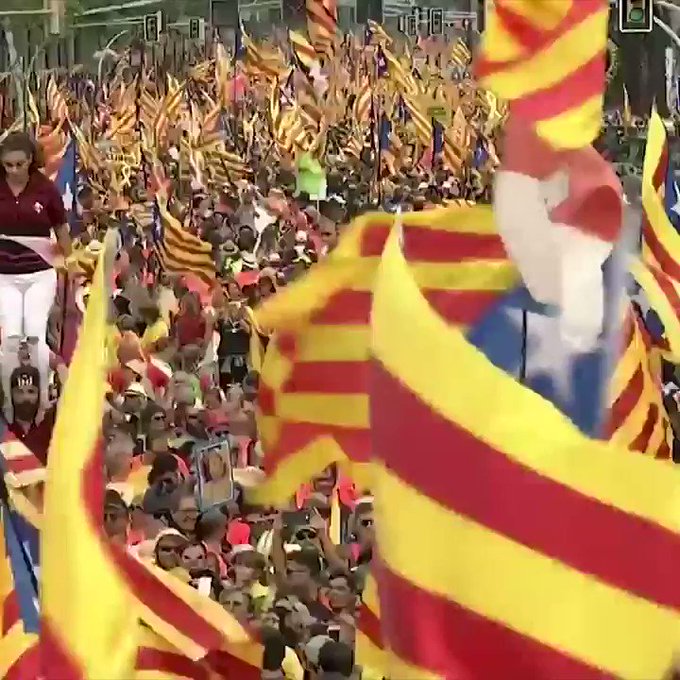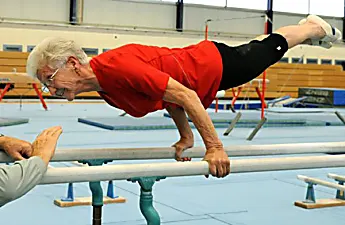September 11, 2018 21H:28 GMT/UTC/ZULU TIME
Latest update : 2018-09-11
Around one million Catalans rallied in Barcelona on Tuesday, banging drums and blowing whistles in a show of support for independence nearly a year after a failed attempt to break away from Spain.
Wearing coral-red T-shirts and waving the red, yellow and blue Catalan separatist flag, a sea of protesters gathered for the rally on Catalonia's "national day" which commemorates Barcelona's fall to troops loyal to Spain's King Philip V in 1714.
The annual "Diada" holiday has since 2012 been used to stage a massive rally calling for secession for the wealthy northeastern region with its own distinct language.
But this year's event had particular significance as a test of strength after a referendum last October 1, and the Catalan parliament's unilateral declaration of independence on October 27, all came to naught.
Demonstrators climbed on each others shoulders to form human towers, a Catalan tradition, while others carried yellow and black signs that read "Free Catalan political prisoners now", a reference to Catalan separatist leaders in jail awaiting trial over last year's independence bid.
"I am outraged ... the political prisoners have to be released now!, said Santi Noe, 54, who came to the rally from his farm in El Maresme near Barcelona on his green tractor, one of dozens of tractors at the event.
City police said on Twitter that around one million people took part, a similar amount to last year's protest.
Organisers said they had sold over 200,000 coral-red T-shirts -- the colour used in the ties used to secure the ballot boxes during last year's contested referendum.
At the start of the rally demonstrators knocked down a symbolic wall decorated with separatist symbols, a metaphor for the power of the people to overcome obstacles and achieve independence.
'No plan'
Catalan president Quim Torra said the rally marks the start of a "mass mobilisation". Further protests are planned for an anniversary of last year's banned referendum, which was marred by police violence, and on the anniversary of the failed declaration of independence.
In a televised address on Monday, he said his government was "committed to implementing the republic" Catalans voted for in the referendum.
But Oriol Bartomeus, politics professor at the Autonomous University of Barcelona, said that "listening to the speeches of the separatist leaders, it seems like there is no plan."
Opposition parties complain that separatists have transformed the "Diada" into a holiday which excludes the half of the Catalan population that does not favour independence.
"Today, more than half of Catalonia cannot celebrate anything," said Ines Arrimadas, head of the centre-right, anti-independence Ciudadanos party in Catalonia.
A closely-watched Catalan government poll in July showed 46.7 percent of Catalans want an independent state, just ahead of 44.9 percent who were opposed.
Separatist parties won a slim majority of seats in the Catalan parliament in a December election, even though they captured just 47.5 percent of the popular vote.
"On a day like today, we Catalans should celebrate our national day and not just a call for independence that is shared by less than half of the population," Spanish Foreign Minister Josep Borrel, who is Catalan, said in Strasbourg.
Separatist divisions
There are also growing divisions in separatist ranks -- between those who want to provoke a clash with Madrid and those seeking a more conciliatory approach.
"If a separatist is so naive or stupid to believe he can impose independence on the 50 percent of Catalans who are not (separatists), it's clear that they are mistaken," Joan Tarda, a lawmaker for separatist party ERC in the Spanish parliament, said last week.
The ERC has a taken softer approach than its ally in the regional government -- former Catalan president Carles Puigdemont's Together for Catalonia.
Puigdemont was sacked by Madrid after last year's independence declaration and fled to Belgium.
Spain's conservative prime minister Mariano Rajoy then imposed direct rule on Catalonia and called early elections.
Rajoy's successor, socialist Pedro Sanchez, was catapulted to power in June with the support of separatist parties.
Sanchez has offered the region a referendum on greater autonomy, but this was rejected by Torra, who insists Madrid must allow a legally binding independence referendum for Catalonia's 7.5 million people.
Date created : 2018-09-11
Leave a comment





![[Pics] Heartbreaking Facts From The Mollie Tibbetts Case [Pics] Heartbreaking Facts From The Mollie Tibbetts Case](https://images.outbrainimg.com/transform/v3/eyJpdSI6Ijk0OTgzMDljOTY0MzcxM2U3N2Y3YmQwMmZjMDM2MzEwZWExZjgyMjEwYjUyMzI4ZjdiMjdlYjQ0YTVlNDRlOTIiLCJ3IjoyMzAsImgiOjE1MCwiZCI6MS41LCJjcyI6MCwiZiI6MH0.webp)
![[Photos] These Pictures Was Taken Just a Second Before Fishing Stopped Being Fun [Photos] These Pictures Was Taken Just a Second Before Fishing Stopped Being Fun](https://images.outbrainimg.com/transform/v3/eyJpdSI6IjI3OWM5MjIwNmRjNTM0NGVhNzI4ZWYwYWE2NjhkZmY0NWQyYzU4ZGVkNTE1YmJiYTgyMDQxZGYyZGMyMjhhZGUiLCJ3IjoyMzAsImgiOjE1MCwiZCI6MS41LCJjcyI6MCwiZiI6MH0.webp)
![[Gallery] A Man Put His Head In A Particle Accelerator In 1978. Here’s The Insane Impact It Had On His Body [Gallery] A Man Put His Head In A Particle Accelerator In 1978. Here’s The Insane Impact It Had On His Body](https://images.outbrainimg.com/transform/v3/eyJpdSI6IjA0MDgwZjcyOWVlOWIxZTE3ZmFlN2FmNTYwOTE5MmYyNzQyYTQyODI0NTI2MzVmMWUyMmMyZmU3ZGU4NTgwYzMiLCJ3IjoyMzAsImgiOjE1MCwiZCI6MS41LCJjcyI6MCwiZiI6MH0.webp)

No comments:
Post a Comment